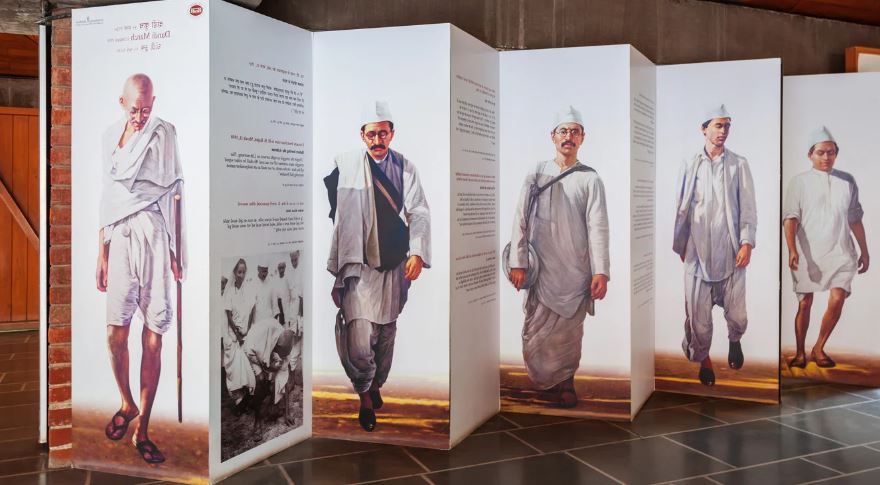Social work has long been an essential part of Indian society, where activists have championed various causes to bring about positive changes in the nation.
From fighting for social justice to improving living conditions, India’s social workers have made remarkable contributions across diverse areas.
In this blog, we will explore the role of social workers, their impact on society, and list the top 10 famous social workers in India who have become household names.
What is the Role of Social Workers in India?
Social workers in India play a multifaceted role, addressing critical societal issues and uplifting marginalized communities. They advocate for human rights, improve access to basic services like healthcare and education, and work to eradicate systemic inequalities. In a country where poverty, illiteracy, and social stratification are deeply rooted, social workers function as agents of change.
Their role is not limited to charity work or aid. Social workers are often involved in policy-making, community development, and advocacy. They work with both governmental and non-governmental organizations (NGOs) to create sustainable solutions for pressing problems.
Key aspects of their role include:
- Advocating for marginalized communities, including women, children, and the elderly.
- Implementing grassroots initiatives for education, sanitation, and healthcare.
- Promoting social reforms, focusing on human rights, gender equality, and social justice.
- Collaborating with government bodies to influence policies related to welfare and development.
How Have Famous Social Workers Shaped Indian Society?
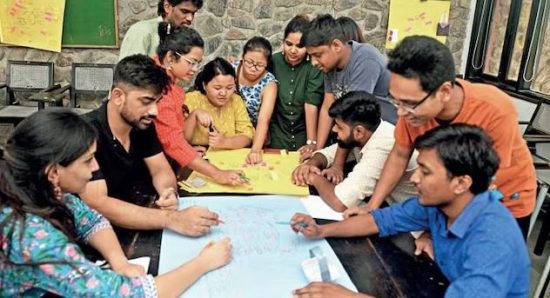
Image – Source
Famous social workers have had a profound impact on Indian society by addressing issues like poverty, gender discrimination, and illiteracy. They have brought about legal reforms, created awareness about human rights, and inspired millions to contribute towards building a better society.
Individuals like Vinoba Bhave initiated movements that redistributed land to the landless, promoting social equity. Others, like Medha Patkar, have fought against large-scale displacement caused by developmental projects. Their work has not only led to legal reforms but also fostered a culture of civic activism in India.
Their contributions have led to:
- Major legal reforms, such as the Right to Information Act, were influenced by social activists like Aruna Roy.
- Social movements have reshaped communities, like the Chipko Movement by Sundarlal Bahuguna, which protected forests.
- Increased public awareness about key issues such as environmental conservation, women’s rights, and child labour.
Why is Social Work Important for India’s Development?
Social work is crucial to India’s development because it addresses the root causes of many societal problems that hinder progress. By focusing on vulnerable populations, social workers promote inclusive growth and reduce socio-economic disparities. Whether it is through advocating for better education and healthcare or fighting poverty, their contributions are integral to the nation’s progress.
India, with its vast population and complex socio-economic landscape, requires the efforts of social workers to bridge gaps in government services. Their grassroots efforts complement governmental initiatives and often reach communities that are otherwise neglected.
The importance of social work in India’s development lies in:
- Tackling socio-economic inequalities, helping the poor and underprivileged access resources.
- Improving literacy and education by working on the ground with children in rural and urban slum areas.
- Creating health awareness, particularly in rural regions where access to medical facilities is limited.
How Can Social Workers Drive Change in Rural India?
Rural India, which still suffers from infrastructural and developmental gaps, benefits immensely from the efforts of social workers. These individuals act as a bridge between the urban-centric policies and the rural communities. Social workers bring innovation and awareness to rural India, empowering communities to be self-reliant.
One of the key ways they drive change is by focusing on capacity building. Through education, vocational training, and awareness programs, social workers enable rural populations to improve their living standards and create sustainable livelihoods.
Social workers in rural India focus on:
- Promoting sustainable agriculture through training and development programs.
- Introducing sanitation and hygiene practices, especially with the help of organizations like Sulabh International.
- Empowering women through education and vocational training enables them to participate actively in the local economy.
How Are Social Workers Contributing to Modern India?
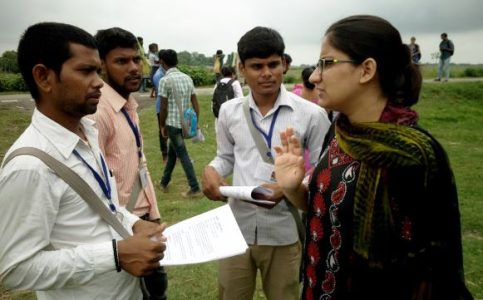
Image – Source
In modern India, social workers are leveraging technology and innovation to create more impactful changes. From social entrepreneurship to digital advocacy, social workers today are addressing a wider range of issues, including environmental sustainability, human rights, and transparency in governance.
Social activists like Harsh Mander are focusing on inclusive growth by advocating for the homeless and destitute, while Ramveer Tanwar is working to rejuvenate lakes and water bodies in rural India. These efforts are aligned with India’s vision of becoming a progressive and equitable society.
Key contributions to modern India include:
- Digital campaigns and activism, using technology to spread awareness and mobilize people for social causes.
- Environmental conservation, with a focus on combating climate change and promoting sustainable practices.
- Human rights advocacy ensures that marginalized sections of society receive the benefits of modern development.
What Challenges Do Social Workers in India Face Today?
Despite their dedicated efforts, social workers in India face numerous challenges that hinder their progress. One of the major issues is the lack of resources, including funding and institutional support. Social workers often operate in hostile environments, especially when challenging entrenched social norms or corrupt political systems.
Moreover, many social workers work in remote areas where the infrastructure for healthcare, education, and communication is inadequate. Cultural and societal resistance also adds to their difficulties, particularly when dealing with sensitive issues like caste-based discrimination or women’s rights.
Challenges faced by social workers include:
- Limited funding and resources, particularly for grassroots organizations.
- Cultural and societal opposition, especially when challenging traditional practices.
- Personal risk and security issues, particularly in regions with social unrest or political instability.
Top 10 Famous Social Workers in India
1. Vinoba Bhave
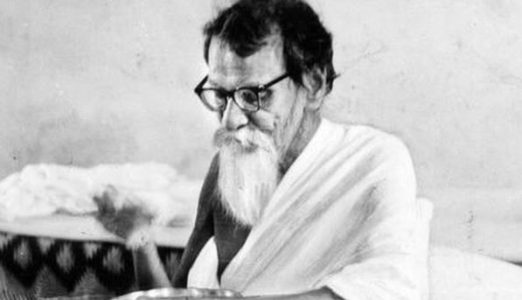
Image – Source
Vinoba Bhave is celebrated as one of the most influential social workers in post-independence India. A close associate of Mahatma Gandhi, he was deeply inspired by Gandhi’s philosophy of non-violence and worked extensively to promote rural development.
His most famous initiative, the Bhoodan Movement, was a response to the growing inequalities in land ownership that plagued India’s rural communities.
Let’s explore their contributions, awards, achievements and so on:
- Contribution: Initiated the Bhoodan Movement (Land Gift Movement) to distribute land to the poor.
- Awards: Ramon Magsaysay Award for Community Leadership (1958).
- Achievements: Redistribution of over 4 million acres of land for the landless.
- What they founded: Bhoodan Movement (1951).
- Time Period: Active during post-independence India, from the 1950s to 1980s.
- More Insights: Known as Gandhi’s spiritual successor, Vinoba Bhave was a prominent figure in the non-violence movement.
The Bhoodan Movement encouraged wealthy landowners to voluntarily donate land to landless farmers, addressing one of India’s most pressing social issues: poverty and landlessness. Bhave travelled across the country to spread awareness about the movement, garnering massive support and making significant strides in redistributing land to those in need.
Bhave’s efforts were a testament to his commitment to Gandhian values. His simple lifestyle, dedication to social justice, and advocacy for non-violence left a lasting impact on Indian society, especially in rural India, where his contributions helped bridge the gap between the rich and the poor.
2. Kailash Satyarthi
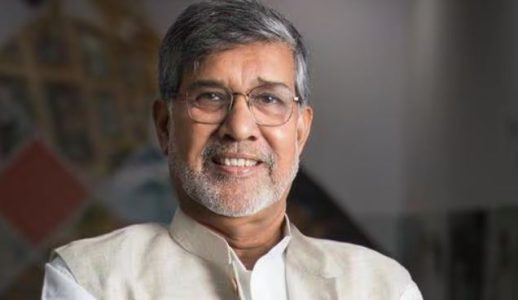
Image – Source
Kailash Satyarthi has become an international symbol of the fight against child labor and child slavery. His work spans several decades, during which he has tirelessly advocated for children’s rights, leading to significant progress in freeing tens of thousands of children from bonded labor in India.
His efforts are not only restricted to India but also resonate globally, especially through his role in the Global March Against Child Labor.
Let’s explore their contributions, awards, achievements and so on:
- Contribution: Fought against child labour and advocated for children’s rights.
- Awards: Nobel Peace Prize (2014), shared with Malala Yousafzai.
- Achievements: Rescued over 85,000 children from child labour and slavery.
- What they founded: Bachpan Bachao Andolan (Save the Childhood Movement).
- Time Period: Active since the 1980s, still continuing.
- More Insights: Known for global advocacy on children’s rights, including his role in the Global March Against Child Labor.
Satyarthi’s organization, Bachpan Bachao Andolan, has played a critical role in mobilizing efforts to end child labor and promote children’s rights. His advocacy has pushed governments to enact stricter laws against child exploitation while also providing rescued children with rehabilitation and education.
In 2014, Satyarthi was awarded the Nobel Peace Prize alongside Malala Yousafzai, highlighting his lifetime commitment to ensuring that children are given the opportunity to live free from exploitation. His relentless pursuit of justice continues to inspire activists worldwide in the fight for children’s rights.
3. Baba Amte
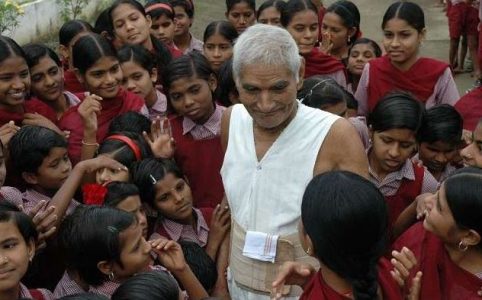
Image – Source
Baba Amte was one of the most beloved social workers in India, dedicating his life to the service of leprosy patients, who were ostracized from society. He founded Anandwan, a self-sustaining community for leprosy patients, where they could live with dignity and be empowered through vocational training.
His work was revolutionary, as he not only provided medical care but also advocated for the social inclusion of people suffering from leprosy.
Let’s explore their contributions, awards, achievements and so on:
- Contribution: Dedicated his life to the care and rehabilitation of leprosy patients.
- Awards: Ramon Magsaysay Award (1985), Padma Shri, Padma Vibhushan.
- Achievements: Established Anandwan, a self-sustaining community for leprosy patients.
- What they founded: Anandwan (1951).
- Time Period: Active from the 1950s until his death in 2008.
- More Insights: Known for his holistic approach to rehabilitation and social inclusion of leprosy patients.
Amte’s philosophy centered around the idea of rehabilitation through self-sufficiency. Under his guidance, Anandwan flourished, becoming a model for other social projects focused on inclusivity and empowerment of marginalized communities. His dedication to the cause earned him national and international recognition, making him a prominent figure in humanitarian work.
Despite his focus on leprosy patients, Amte’s efforts were not limited to healthcare. He was also involved in environmental activism and contributed significantly to raising awareness about social injustices in India. His legacy continues through his family, who have taken forward his work at Anandwan.
4. Anna Hazare
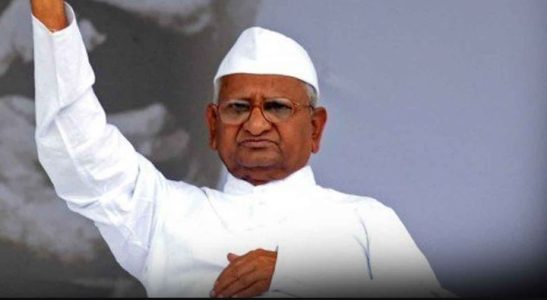
Image – Source
Anna Hazare is one of India’s most prominent anti-corruption activists, known for his peaceful protests and hunger strikes that galvanized nationwide movements.
His activism began with rural development projects, particularly in his village of Ralegan Siddhi, where he introduced water conservation methods, tree planting, and the use of renewable energy, turning it into a model of sustainable development.
Let’s explore his contributions, awards, achievements and so on:
- Contribution: Anti-corruption activist and promoter of rural development.
- Awards: Padma Bhushan (1992).
- Achievements: Inspired the Indian Anti-Corruption Movement (2011).
- What they founded: Ralegan Siddhi village model for rural development.
- Time Period: Active from the 1970s to the present.
- More Insights: His hunger strikes gained national attention, leading to significant political reforms.
In the 2010s, Hazare’s influence grew beyond rural development when he led the India Against Corruption movement. His hunger strikes drew massive support across the country and pressured the Indian government to introduce the Jan Lokpal Bill, an anti-corruption legislation aimed at increasing transparency in governance.
Hazare’s methods, inspired by Mahatma Gandhi, focused on non-violent resistance and public mobilization. His work has made a lasting impact on both rural development and anti-corruption movements in India, making him an enduring symbol of integrity and reform.
5. Vandana Shiva
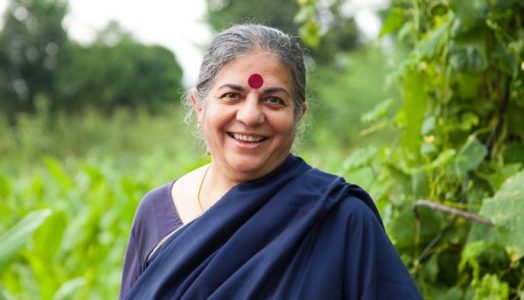
Image – Source
Vandana Shiva is a globally renowned environmental activist and eco-feminist, known for her advocacy against industrial agriculture, genetically modified crops, and environmental degradation. Her work centers on protecting biodiversity, promoting organic farming, and advocating for sustainable agricultural practices that respect local ecosystems.
Shiva’s activism gained prominence during the global debate over genetically modified organisms (GMOs), where she opposed large corporations that monopolized seed markets and threatened traditional farming methods. Her organization, Navdanya, focuses on seed saving and biodiversity conservation, helping farmers preserve their autonomy over their crops.
Let’s explore their contributions, awards, achievements and so on:
- Contribution: Environmental activist, particularly against genetically modified crops and large-scale industrial farming.
- Awards: Right Livelihood Award (1993).
- Achievements: Global advocate for organic farming and biodiversity.
- What they founded: Navdanya (a movement promoting organic farming and seed saving).
- Time Period: Active since the 1970s.
- More Insights: A prominent eco-feminist, her work emphasizes the connection between environmental sustainability and social justice.
In addition to her environmental activism, Shiva is a strong advocate for women’s rights, especially in rural India. Her work emphasizes the link between environmental sustainability and social justice, ensuring that the voices of women and marginalized communities are heard in the global environmental discourse.
6. Ela Bhatt
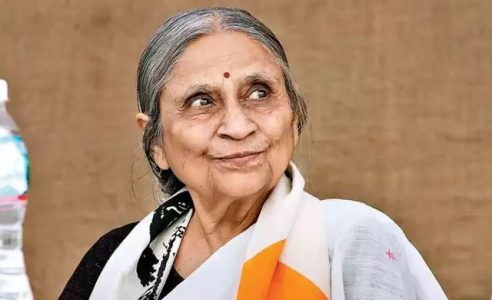
Image – Source
Ela Bhatt is a trailblazer in the field of women’s rights and economic empowerment, particularly for those in India’s informal sector.
Through her work with SEWA (Self-Employed Women’s Association), she has provided countless women with access to financial services, vocational training, and legal rights, transforming their lives and improving their economic independence.
Let’s explore their contributions, awards, achievements and so on:
- Contribution: Empowered women in the informal sector by advocating for their rights and providing them access to financial services.
- Awards: Ramon Magsaysay Award (1977), Padma Bhushan (1986).
- Achievements: Created a large cooperative network for women workers.
- What they founded: SEWA (Self-Employed Women’s Association) in 1972.
- Time Period: Active since the 1970s.
- More Insights: Recognized globally for her work on women’s rights and economic empowerment.
Bhatt’s vision for SEWA was to create a cooperative that catered to the needs of women working in unorganized sectors such as agriculture, handicrafts, and small-scale trade. Today, SEWA is a global model for women’s cooperatives, with over 1.5 million members benefiting from its services.
Her work has garnered global recognition, and she continues to advocate for women’s rights, focusing on issues such as fair wages, social security, and gender equality. Bhatt’s pioneering efforts have left a lasting impact on the socio-economic landscape for women in India.
7. Medha Patkar
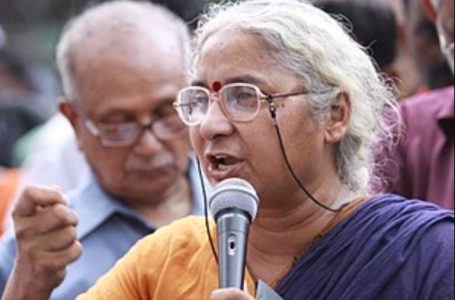
Image – Source
Medha Patkar is an iconic social activist best known for her role in leading the Narmada Bachao Andolan, a movement that opposed large dam projects in India that led to the displacement of thousands of people. Patkar’s advocacy has focused on the rights of those affected by developmental projects, highlighting the human cost of displacement and environmental degradation.
Let’s explore their contributions, awards, achievements and so on:
- Contribution: Leading activist against large dam projects and displacement.
- Awards: Right Livelihood Award (1991), Amnesty International Human Rights Defender Award.
- Achievements: Fought for the rights of the displaced communities in the Narmada Valley.
- What they founded: Narmada Bachao Andolan (Save Narmada Movement).
- Time Period: Active since the 1980s.
- More Insights: Her activism raised global awareness of the human cost of developmental projects.
The Narmada Bachao Andolan brought global attention to the plight of marginalized communities who were displaced by the construction of dams. Patkar’s activism led to legal battles that questioned the ethics and sustainability of large-scale industrial projects in India.
Through her tireless efforts, Patkar has become a symbol of resistance against unchecked development. Her work emphasizes the need for sustainable, people-centered development that prioritizes the well-being of communities over industrial expansion.
8. Harsh Mander
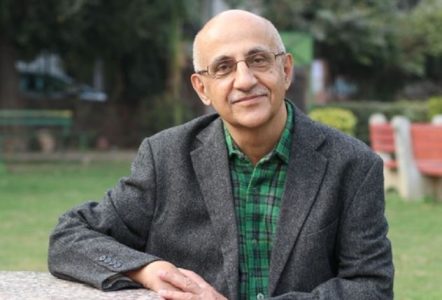
Image – Source
Harsh Mander is a social activist and author who has dedicated his life to advocating for the rights of marginalized communities in India, especially the homeless and survivors of communal violence. His work focuses on social justice, equality, and the need for compassion in addressing issues of poverty, homelessness, and exclusion.
Let’s explore their contributions, awards, achievements and so on:
- Contribution: Focused on the rights of marginalized communities, especially the homeless and survivors of communal violence.
- Awards: National RTI Award (2011).
- Achievements: Instrumental in social inclusion policies and communal harmony initiatives.
- What they founded: Centre for Equity Studies.
- Time Period: Active since the 1990s.
- More Insights: His work in the field of social justice has highlighted issues of poverty, inequality, and exclusion.
Mander has played a significant role in shaping policies related to social inclusion, and his efforts in communal harmony have helped bridge divides in conflict-affected regions. He has also been instrumental in creating platforms for dialogue and understanding between different communities.
Through his writings and activism, Mander has continuously advocated for a more inclusive and equitable society. His organization, the Centre for Equity Studies, works to provide research and advocacy for the most marginalized communities in India.
9. Ramveer Tanwar

Image – Source
Ramveer Tanwar is an environmentalist and social worker who has become a well-known figure in India’s water conservation efforts.
He is particularly focused on reviving lakes, ponds, and other water bodies that have been neglected or destroyed by urbanization and pollution. His grassroots efforts have helped restore several water bodies, improving water access for communities in rural India.
Let’s explore their contributions, awards, achievements and so on:
- Contribution: Environmentalist focused on lake rejuvenation and water conservation.
- Awards: Water Heroes Award by the Government of India.
- Achievements: Revived several lakes and ponds across India.
- What they founded: Jal Chaupal, an initiative for water conservation awareness.
- Time Period: Active since the 2010s.
- More Insights: Known for his grassroots efforts in water conservation, particularly in rural areas.
Tanwar’s initiative, Jal Chaupal, is a platform for raising awareness about water conservation and sustainable management of water resources. Through this initiative, he has mobilized local communities to take responsibility for protecting their water sources.
Tanwar’s work has been recognized by the Government of India, and he continues to be a vocal advocate for environmental sustainability, particularly in relation to water conservation.
10. KV Rabiya

Image – Source
KV Rabiya is a remarkable social worker known for her work in education and the empowerment of marginalized groups, especially women and disabled individuals. Despite being disabled herself, Rabiya has spent her life helping others, establishing schools for the disabled and vocational training centers for women in rural areas.
Let’s explore their contributions, awards, achievements and so on:
- Contribution: Focused on the education and rehabilitation of marginalized groups, particularly women and disabled individuals.
- Awards: Several local and national accolades for her contribution to education.
- Achievements: Established schools for the disabled and vocational training centres for women.
- What they founded: Jan Shikshan Sansthan (a literacy movement for the marginalized).
- Time Period: Active since the 1980s.
- More Insights: Despite being disabled herself, KV Rabiya has dedicated her life to social upliftment through education.
Her literacy initiatives, such as the Jan Shikshan Sansthan, have helped provide education to those who would otherwise have no access to formal schooling. Rabiya’s work has also focused on rehabilitating disabled individuals, helping them become self-sufficient and active members of society.
Her dedication to social upliftment, despite personal challenges, has earned her recognition and respect across India. Rabiya’s life is an inspiring example of how one person’s efforts can bring about meaningful change for thousands.
Conclusion
India’s social workers have played a pivotal role in transforming both individual lives and society as a whole. Their tireless efforts have addressed a wide range of social issues, from poverty and inequality to discrimination and injustice.
By advocating for the rights of marginalized communities, these social workers have not only provided immediate relief and support but also laid the foundation for long-term societal change.
In battling injustice, they have taken on systemic challenges, pushing for reforms in education, healthcare, gender equality, and access to basic services.
Their work has ensured that individuals from underprivileged backgrounds, including women, children, and minorities, are given the opportunity to lead dignified lives.
FAQs
What are the key contributions of Mother Teresa in India?
Mother Teresa founded the Missionaries of Charity in Kolkata, helping the poor, the sick, and the dying. Her organization expanded globally, with her work earning her the Nobel Peace Prize.
How has Aruna Roy impacted India’s governance?
Aruna Roy played a pivotal role in the Right to Information Act (RTI) that increased government transparency and accountability, empowering ordinary citizens.
What is the significance of the Chipko Movement?
Led by Sundarlal Bahuguna, the Chipko Movement was an environmental initiative where villagers, particularly women, hugged trees to prevent their deforestation, raising awareness about ecological conservation.
What does Sulabh International do in India?
Dr. Bindeshwar Pathak’s Sulabh International provides affordable sanitation solutions to rural and urban poor, focusing on hygiene and social dignity through clean public toilets.
What are the goals of SEWA (Self-Employed Women’s Association)?
Founded by Ela Bhatt, SEWA advocates for the rights and welfare of women working in informal sectors, focusing on improving working conditions, fair wages, and financial independence.
What role does the Barefoot College play in rural development?
Bunker Roy’s Barefoot College empowers rural communities by training villagers, especially women, in sustainable technologies like solar energy, creating self-reliant communities.
What is the Bhoodan Movement?
Vinoba Bhave’s Bhoodan Movement aimed to redistribute land to the landless poor, encouraging landowners to donate their land for social equity.

